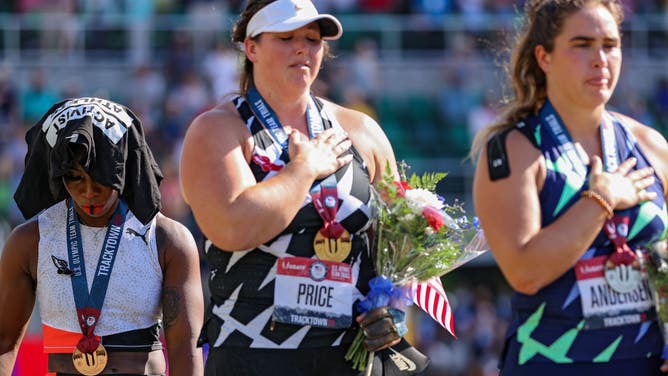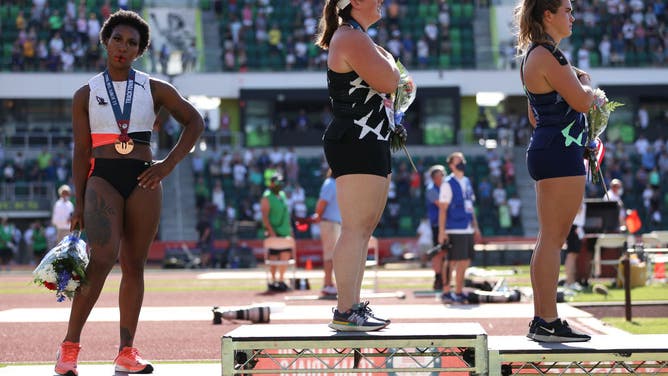Gwen Berry Says 'We'll See' When Asked If She'll Protest At Olympics
Gwen Berry, the U.S. Olympic hammer thrower who came under fire for turning her back during the national anthem at track and field trials, dismissed assertions she hates the country she represents and said only time will tell if she will protest at the Olympics.
"We'll see ... It depends on how I'm feeling," the track and field star said while appearing on "Don Lemon Tonight" Thursday. "It depends on what I want to do in that moment, and what I want to do for my people in that moment."
Berry faced away from the American flag and held up a t-shirt that read "activist athlete" as the "The Star-Spangled Banner" played during the Olympic qualifiers ceremony. Berry quickly drew backlash over her actions, which she said were in protest of the treatment of the Black community.
"I do respect the Constitution," Berry told Lemon. "But I will not stand for any symbol or song that does not stand for all people in America."

EUGENE, OREGON - JUNE 26: Gwendolyn Berry (L), third place, turns away from U.S. flag during the U.S. National Anthem as DeAnna Price (C), first place, and Brooke Andersen, second place, also stand on the podium after the Women's Hammer Throw final on day nine of the 2020 U.S. Olympic Track & Field Team Trials at Hayward Field on June 26, 2021 in Eugene, Oregon. In 2019, the USOPC reprimanded Berry after her demonstration on the podium at the Lima Pan-American Games. (Photo by Patrick Smith/Getty Images)
When asked by Lemon which part of the song upset her, Berry said, "It's all of these words. Freedom, justice... these are things that do not hold true for all Americans."
She also shared the CNN interview to her Instagram.
"Liberty and justice for ALL," Berry captioned the Instagram post. "Until this is true, I will not waver." She added, "I will stand for my people, I will speak for my communities."
While certain racial and social justice demonstrations were allowed at the Olympic and Paralympic trials, kneeling and other forms of protest have been banned at the 2021 Tokyo Olympic Games. Should she choose to protest again, Berry will be in violation of the International Olympic Committee's Rule 50.

Gwendolyn Berry (L), third place, turns away from U.S. flag during the U.S. National Anthem as DeAnna Price (C), first place, and Brooke Andersen, second place, also stand on the podium after the Women's Hammer Throw final on day nine of the 2020 U.S. Olympic Track & Field Team Trials at Hayward Field on June 26, 2021 in Eugene, Oregon. In 2019, the USOPC reprimanded Berry after her demonstration on the podium at the Lima Pan-American Games. (Photo by Patrick Smith/Getty Images)
In April, OutKick's Sam Amico reported the International Olympic Committee officially stamped out the idea of social justice protests at the 2021 summer games in Tokyo.
Berry said using her voice is her priority over any repercussions, including losing sponsorships, The Hill reports.
"I've already been through all of that," she said. "And yet I am still here, still saying that my Black communities need help."